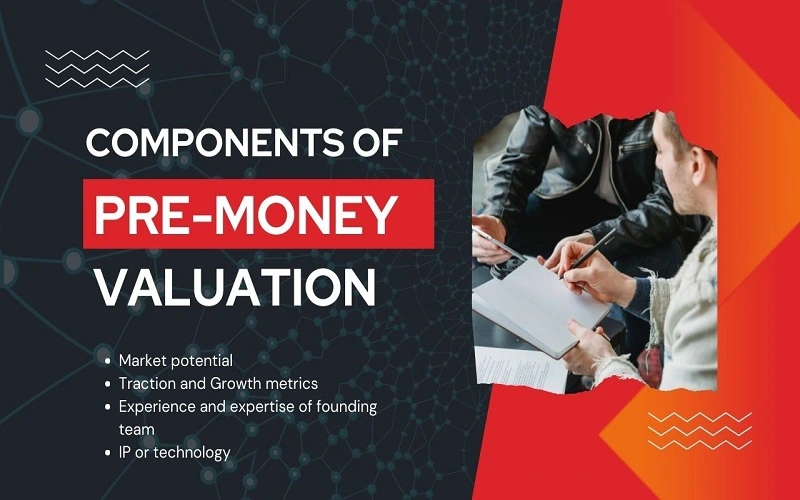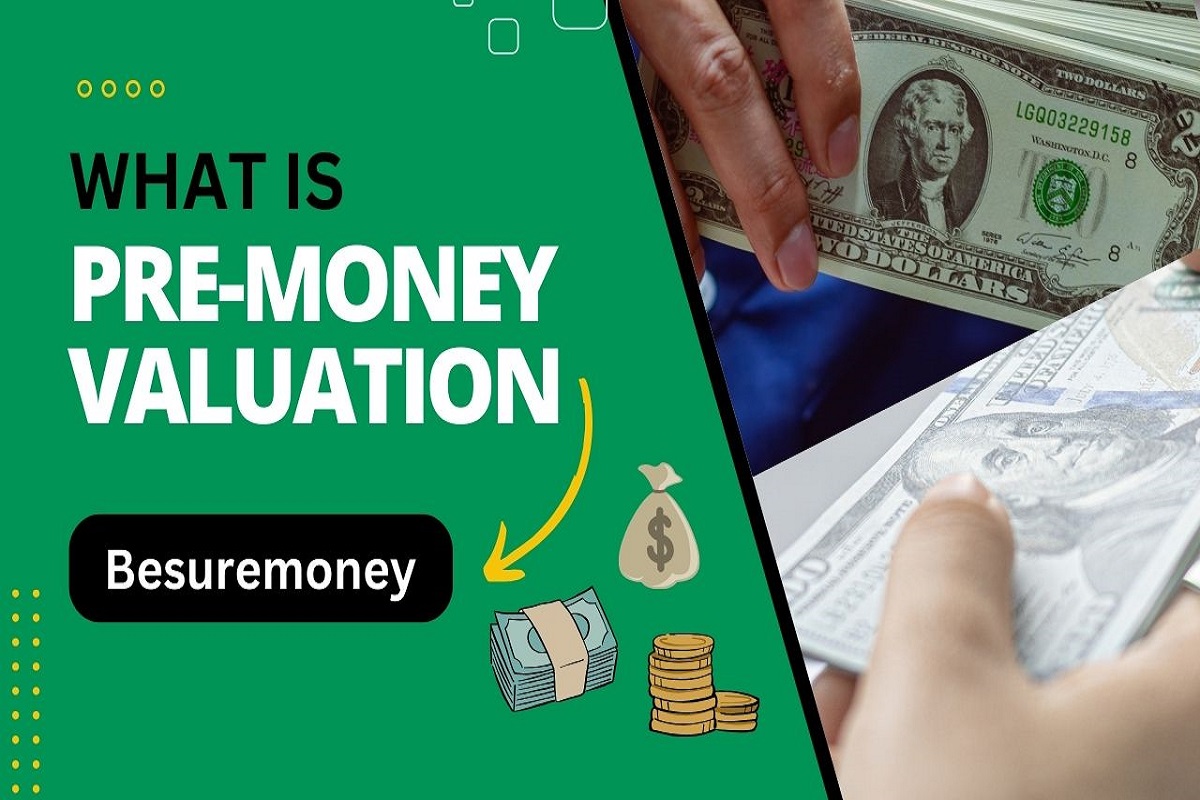Understand that entrepreneurs need to know pre-money valuation information and investors should also be aware of it to make better decisions. These metrics help establish a startup’s value pre-investments and impact how deals are structured. In this article, we will discuss pre-money valuation, its components, how to calculate the same, real-world examples, and how to deal with the same practically.
What is pre-money valuation?
Pre-money valuation (the value of the company equity before it takes on cash for a round of financing it is about to start). The cash in the company is valued more and since a company with cash in its balance sheet has a higher price (the money adds to its equity value) we had a pre-money valuation since we recently raised some money.
The expression is common with venture capitalists and other investors who are a bit more removed from the company. This valuation and the amount they wish to invest will then give them a tangible idea of what their shareholding in the company would be.
What are the components of pre-money valuation?

Few things affect the pre-money valuation in a startup all of these come together to significantly affect the overall price of the company:
Market potential:
How big (current and projected) the target market of the startup is. A bigger market with strong growth prospects can change prices materially.
Traction and Growth metrics:
Customer acquisition, revenue, user engagement, and other performance metrics show how far along the startup is and how fast it can run.
Experience and expertise of founding team:
The skills and background of the founding team and the trajectory of its members. Because investors typically place a higher premium on teams with experience in executing the business plan.
IP or technology:
Competitive advantage from proprietary technology, patents, trademarks, or other unique intellectual property.
How to calculate pre-money valuation?

There are a few methods for calculating and some are made for early or growth-stage startups. Common approaches include:
Comparable Company Analysis:
It is that process that entails comparing the startups with other types of companies that are like it and have been valued or sold lately. One can also estimate the fair value of the startup by looking at the price multiples of the likes of these companies.
Discounted Cash Flow:
In this process, you project the future cash flows of the startup and discount them back to the present with a discount rate. It is a more nuanced way for less risky revenue streams, scalable such as in the case of startups.
Berkus Method:
This is the simplified version for early-stage startups. That is, it attaches a value to various risk factors from largest to smallest. The general soundness of the idea, the existence of a prototype, the quality of the management team, strategic relationships, and the product rollout or potential sales.
Scorecard Valuation Method:
It is an intra-method that adjusts the average pre-money valuation of several transactions over time for the average startup in the region by measuring how your start observers up compare against a set of factors such as team, product, sales, behavior, stage, etc. Every individual factor is ultimately scored and rated to make the final valuation.
What is the impact of pre-money valuation on investment deals?

The conditions of an investment deal are considerably affected by the pre-money valuation. Here some impacts are as follows:
Equity Dilution:
The pre-money valuation means how much of the company the entrepreneur must sell to raise a given amount of capital The higher trade-off in pre-money pricing gives less of an ownership part to the founders, and a lower value means more ownership to investors.
Investor Stake:
Investor Stake affects the investor’s proportional ownership based on their investment. For example, if an investor used a $5 Million pre-money valuation to invest $1 the investors would get 16.67% of the company ($1 Mill / ($5 Mill + $1 Mill)).
Negotiating Power:
Pre-money valuation makes it easier for an entrepreneur to keep a beneficial share of company ownership in discussions with possible investors. On the other hand, a high price without justification could scare investors or they can get terms.
Future fundraising rounds:
Ensuring that you set the right pre-money will also impact the price you get in the next rounds of future fundraising. Overvalue can enable a company to sustain its early stages. Still, at the same time, it will lead to difficulties in raising follow-up investments if the performance fails to meet expectations which would force down rounds as the only alternatives.
Some common risks and challenges:

Several risks and challenges could plague a start-up and an investor when determining:
Lofty value:
Price the pre-money too aggressively and you risk pricing in too high a bar and forcing the company to scale faster than it is prepared for. If the company fails to do it may have difficulties raising money which might result in down rounds or loss of confidence of the investors.
Undervaluation Outcomes:
On the other extreme, undervaluing a startup yields founders giving too much equity up for so small of an infusion of capital. That ultimately can mean significant dilution of the percentage of the company owned by the founders mutes down their control over the company and can fuel conflicts with investors in the future.
Economic Environment and Market Trends:
The economic and industry landscape can affect massively price. During times when investors are more conservative, which is almost always the case in economic downturns, you can expect value to dip. Startups need to be aware of these external triggers and not expect too much.
Lack of comparable data:
Innovative or niche startups can sometimes struggle to find companies with which to benchmark values. With solid comparables, that makes the price hard to defend which complicates investor negotiations.
Price is Subjective:
Many if not most price methods have some level of subjectivity (e.g., estimating anticipated cash flows, or scoring qualitative factors) Those estimates are susceptible to biases which can result in the startup being valued incorrectly.
Inexperienced Founders:
Founders who regularly undervalue their startup company simply may not know what they have, or be able to do according to their strengths in this case in a way that investors will believe and take seriously. This can result in poor deal terms or missed investment deals.
Conclusion:
Pre-money valuation is also important for a group of investors and entrepreneurs as it will help to build the whole deal of investments and growth. Understanding the fundamentals, how to calculate it, and what can go wrong are the keys for all individuals in decision-making positions trying to form strategic collaborations and advance the success of a startup. If anything, make sure to get ready, value, and share common perspective with investors on it to manage this tricky but necessary nut of the startup ecosystem well.
FAQs:
Q1. Is DCF pre-money or post-money?
Ans: Discounted Cash Flow is also a pre-money valuation method. It approximates the value of a company based on its future cash flows before considering any new investment.
Q2. Does pre-money valuation include debt?
Ans: No, pre-money valuation does not include debt because It has a value of a company before it receives any new investment or financing.
Q3. What is equity based on pre-money valuation?
Ans: Equity-based on pre-money valuation is a company’s ownership percentage given to investors before new funding is added. It is calculated by dividing the investment amount by the company’s value and determining the ownership stake.
Q4. What is the target pre-money valuation?
Ans: Pre-money valuation is the amount of money your company is valued at which does not include the money you are raising during this round.
